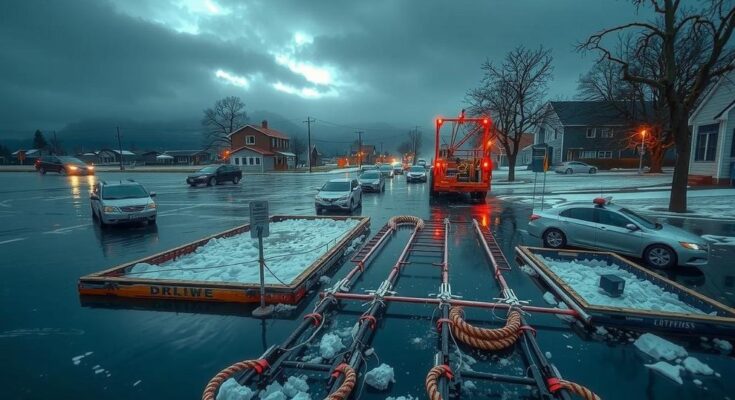Storm Bert’s impact illustrates the link between climate change and increasing storms and flooding. Human activities, particularly greenhouse gas emissions, raise global temperatures, leading to more intense precipitation events. While attributing individual storms to climate change is complex, evidence points to significant connections. Flood infrastructure failures and ongoing individual behaviors complicate responses to climate challenges, highlighting the urgency for reevaluation and action.
Storm Bert recently wreaked havoc across numerous regions, prompting inquiries regarding the correlation between climate change and the increasing frequency and severity of storms and flooding. Scientific evidence pinpoints that human activities, particularly the emission of greenhouse gases, are leading to a rise in global temperatures, which in turn enhances evaporation and increases atmospheric energy. Consequently, this contributes to the formation of more intense storms that result in significant rainfall over localized areas, while summers become increasingly arid.
Determining if Storm Bert was exacerbated by climate change necessitates a detailed examination of recent meteorological events. The phenomenon known as an “atmospheric river” played a pivotal role in this storm, delivering concentrated rain over specific regions for prolonged durations. Such intense rainfall aligns with the patterns anticipated due to climate change, and while attributing a particular storm solely to climate change presents challenges, advancements in meteorological research now allow scientists to better assess the extent to which climate change influences severe weather events. Recent flooding incidents in Colombia and Spain exemplify occurrences that researchers attribute primarily to human-induced climate change.
Although current research on Storm Bert’s attribution has yet to be published, it is evident that climate change is a significant contributing factor. Nevertheless, additional human elements also influenced flood events, such as unexpected rainfall intensity and the failure of critical flood defenses. These shortcomings highlight the complexities surrounding climate change responses—modern infrastructure may no longer be adequate, and in certain contexts, flood defenses could be ineffective altogether. The occurrence of such flooding points to the vital need for reassessment of these defensive structures.
Despite the growing recognition of these climate-related challenges, human behavior continues largely unchanged. Many individuals persist with activities that contribute to climate change, such as flying and driving, even as discussions at global climate conferences reveal a persistent struggle to enact decisive actions against climate change. In essence, while society grapples with the realities imposed by climate change, the required shifts in behavior remain largely elusive.
The discussion surrounding Storm Bert and its implications on flooding connects directly to broader conversations about climate change. As the planet warms due to human-induced greenhouse gas emissions, significant consequences arise, including increased evaporation and atmospheric energy. These changes manifest in the form of intensified storms that can lead to more substantial and localized rainfall. Understanding the interplay between recent storms and climate change enables researchers to assess how likely links exist between individual weather events and the long-term impacts of climate change.
In summary, Storm Bert serves as a poignant example of how climate change manifests in the form of increasingly severe weather events, specifically intensified rainfall and flooding. The recognition that human activities contribute significantly to climate change complicates the attribution of specific storms, such as Bert, to these broader patterns. However, the failures of existing flood defenses and inadequate weather forecasting reveal further challenges in urban planning and climate resilience. As society continues to navigate the implications of climate change, addressing underlying behaviors and enhancing infrastructure will be critical in mitigating future risks.
Original Source: www.bbc.com




